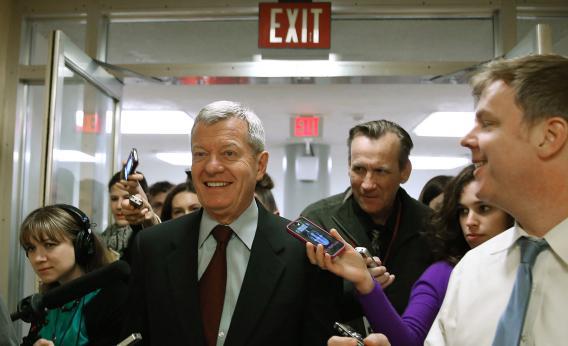There’s a very strange notion afoot that Finance Committee Chairman Max Baucus retiring is going to somehow make tax reform more likely. The way Steven Sloan, Lauren French, and Kelsey Snell put it in Politico is that reform is now an “endeavor he can now devote himself to without the nagging concerns of how it will play back home.”
OK. But that doesn’t even touch the proximate obstacle to tax reform. Here’s the issue. For a tax reform measure to become law, either the president would have to sign a reform bill that cuts rates and raises zero revenue or else Republicans would have to vote for a reform that increases taxes. The former seems extremely unlikely to me, and the latter seems even less likely. Baucus retiring has no more impact on this fundamental piece of gridlock than would Baucus doing a backflip or learning to juggle.
But insofar as Baucus-specific incentives are relevant, I’d say the politics cut in the other direction. Regardless of the specific contents of a tax reform bill, delivering something called “a bipartisan tax reform bill” is exactly the kind of thing a veteran Montana Democrat would want to do to win re-election. Baucus can’t very well run as an outsider who’s going to clean up the mess in Washington, nor can he run as the progressive hero who made the Affordable Care Act possible. He has to run as the bipartisan dealmaker and that means buckling down to make deals. Freed from the constraints of a re-election campaign, Baucus has more grounds on which to drive a hard bargain on behalf of whatever personal, ideological, or lobbyist-driven agenda he happens to find compelling. What’s more, since he’s no longer a vulnerable Democrat seeking re-election, party leaders are less likely to be interested in helping him out. And since he’s no longer a powerful committee chairman who’ll be around for years to come, rank-and-file legislators are less likely to defer to him.
So why the stories about how this makes reform more likely rather than less? I suspect it has to do with the blow to the incomes of ex-Baucusites on K Street that comes with their former boss retiring. Baucus-linked lobbyists have a very strong incentive to try to persuade people that even though Baucus may be irrelevant starting in 2015 that he’s more important than ever in 2013. Some kind of theory whereby retiring increases the odds of a big tax reform deal fits the bill. It just doesn’t make sense.
